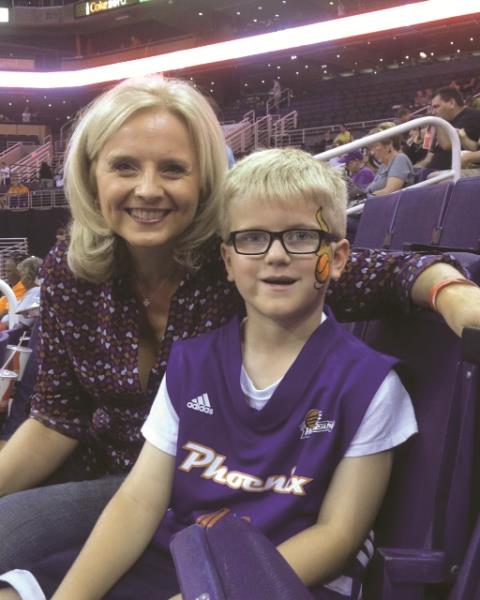
Check back each week for MASK's Dad Dialed In and Minute with Mom series.
The benefits for young girls of a robust professional women’s sports culture is widely accepted. We all know that girls who play sports are more confident, less likely to do drugs, do better academically, and are less at risk for diseases.
Watching women’s sports is essential to this equation because it allows young girls to have role models. Watching professional women’s sports with your daughters gives them something to aspire to. But what about your sons?
Last summer, I was stunned to hear my 6-year-old son tell me that I couldn’t play basketball with him because I was “a girl.” So much for the life lessons I had tried to instill in my son and daughter—that as a man or a woman, you could be anything you want to be when you grow up. In short, we are all equal.
Where had I gone wrong? I was a professionally successful woman, a partner at a law firm with a busy calendar filled with community engagement, and friends from all walks of life. I expected my son to know that men and women are different, but I never thought he, at age 6, would hint that girls were somehow inferior to boys.
What happened next was an inadvertent lesson in gender equality. That lesson began the day Phoenix Mercury center, and No. 1 draft pick in 2013, Brittney Griner took to the basketball court and dunked the basketball right in front of my little boy’s eyes at the team’s season opener. That dunk was a turning point for my son, who soon turned into one of the Mercury’s most dedicated fans, checking scores and stats daily, writing letters to players and collecting autographs.
I soon realized that as much as I know my son loves and respects me as his mom, at age 6, he doesn’t relate to what happens in my life as a professional woman in the courtroom. He relates much better to what happens on the basketball court. And what was happening on the basketball court when he watched these amazing women athletes play was gradually changing how he viewed women.
As moms, we should not lose sight of the power of sports to act as a catalyst for challenging gender stereotypes and as an important vehicle to achieve gender equality. I’m certainly not suggesting that my son is a feminist. But he learned an important life lesson about equality while we ate buckets of popcorn and high-fived each other after a really excellent defensive block or three-point shot.
My son views the Phoenix Mercury as a team of basketball players. Not women basketball players—simply basketball players. Who, by the way, are really good and really fun for a mother and son to watch.
Like lots of little boys his age, my son thinks he is going right from college to becoming a professional basketball player. But, maybe unlike most little boys his age, he wants to be a basketball superstar like three-time gold medal winner and two-time WNBA champion Diana Taurasi—not LeBron James.
As his mom, who spent the last WNBA season hanging out with him around the hardwood, I am absolutely fine with that.